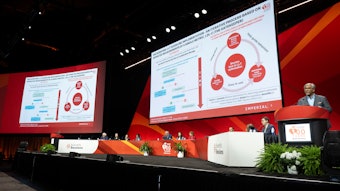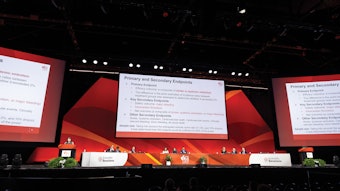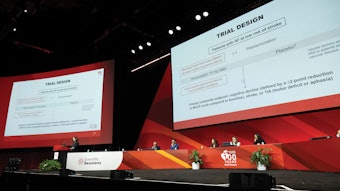Aspirin's staying power
Will newer treatment become the go-to antiplatelet therapy?

Carlo Patrono, MD, FESC, said newer generations of stents designed using polymer materials have reduced the risk of coronary atherothrombosis, so the duration needed for antiplatelet treatment is shorter. That’s why P2Y12 blocker treatments are beginning to rise in popularity — they can be used when stopping dual antiplatelet therapy after PCI, especially in patients at higher risk for bleeding.
Patrono, an adjunct professor of pharmacology at the Catholic University School of Medicine in Rome, will be one of several speakers discussing the past, present and future of antiplatelet therapy in Saturday’s session, “Blood Fuels the Heart: The Discovery, Development and Future of Antiplatelet Therapy in Cardiovascular Disease.”
Despite the availability of newer treatments, Patrono said he believes aspirin is here to stay because no other treatment has been deemed superior by the Food and Drug Administration or the European Medicines Agency.
“There is a disproportionate marketing and publishing pressure behind the newer P2Y12 inhibitors compared to aspirin that may eventually tilt the balance between the unfashionable old and the fashionable new,” he said. “Novel antiplatelet agents targeting a different pathway of platelet activation and aggregation may well come along in the near future, but they are likely to be developed on top of aspirin because of its established efficacy and safety record.”
Aspirin has survived as a first-choice antiplatelet drug 125 years after its initial marketing as an analgesic and anti-inflammatory agent, and Patrono said it isn’t going away any time soon for several reasons.
“First, it has a unique mechanism of action that, together with simple pharmacokinetics, makes aspirin ideally suited to act as an antiplatelet agent,” he said.
“The second factor is the discovery of a mechanism-based biomarker for dose-finding studies in health and disease that guided the choice of the right dose to maximize efficacy and minimize toxicity,” he added. “The third factor is the unusual clinical development of low-dose aspirin driven by the medical/scientific community and characterized by a very large number of investigator-initiated, randomized clinical trials spanning the whole cardiovascular risk continuum.”
In fact, Patrono said ongoing research has shown that aspirin may have new uses far beyond acting as a cardioprotective treatment.
The medical community cannot underestimate “the importance of independent clinical research that was responsible for the development of low-dose aspirin as a life-saving antithrombotic agent,” he said, “and is currently driving its evaluation in the prevention of cancer initiation and progression.”
Other speakers scheduled to take part in the session are Barry Coller, MD, David Rockefeller professor of medicine at Rockefeller University in New York City, and Haydar Satar Ali, MD, a fellow at Emory University Hospital in Atlanta.











